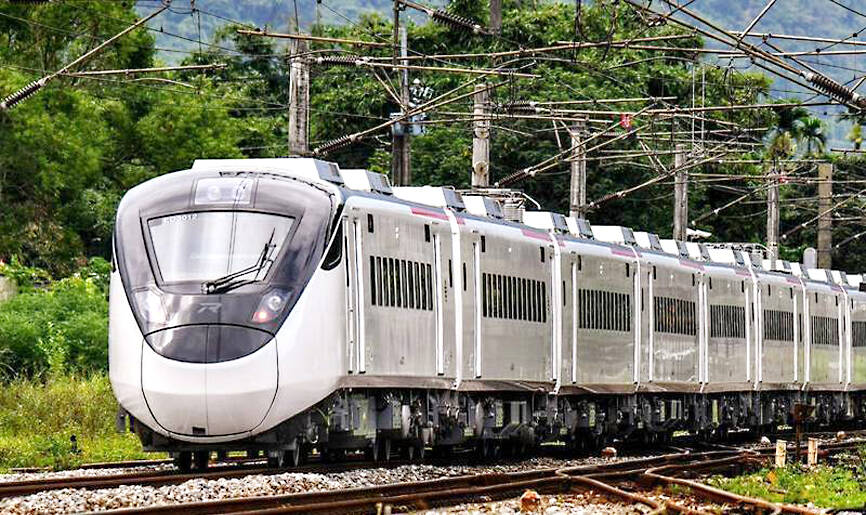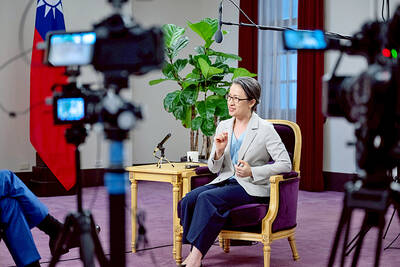Taiwan Railways Administration (TRA) Director-General Tu Wei (杜微) said that ticket prices for railway train services could increase in the second half of next year, in the wake of the agency being restructured as a state-run company on Jan. 1.
Tu, who is set to chair the planned Taiwan Railways Corp, spoke to the media on Saturday and said the company’s board is expected to discuss a plan to raise ticket fares during the first quarter of next year.
If the plan is approved, ticket prices would be adjusted in the second half of next year at the earliest, Tu said.

Photo: Taipei Times file
TRA ticket fares have remained unchanged for 28 years.
The fare rate for each passenger is calculated on a per-kilometer basis, and the local train rate is NT$1.46 (US$0.05) per kilometer, while the Chu-Kuang Express train rate is NT$1.75 per kilometer and the Tze-Chiang Express train rate is NT$2.27 per kilometer, the TRA said.
An earlier TRA proposal for a price hike aimed for a 1 percent rate of return, with the per-kilometer rate for local trains to be increased by 27 percent to NT$1.86, while fares for Chu-Kuang Express trains would go up 15 percent to NT$2.02 and Tze-Chiang Express trains’ fares would increase by 11 percent to NT$2.53.
Tu said that after corporatization, the impact of fare adjustments on the new company’s operation would be small, as according to the statutes governing the establishment of the corporation, the government must cover any losses caused by policies.
It means that if the government decides not to implement fare increases to boost the firm’s revenue, it has to subsidize the difference between the proposed fare increase and the original fare, Tu said.
He was certain train services would run as normal during the Lunar New Year holiday, Tu said, adding that a widely-reported personnel shortage in key roles is to be addressed before the holiday in February next year.
There have been reports saying that more than 1,000 TRA employees could retire or resign in the first six months after corporatization to claim voluntary retirement and resignation incentives with a maximum of seven months’ salary available, leaving the company understaffed.
As of early last month, 978 of the company’s 16,326 employees had applied to quit in the first half of next year, including 374 who perform key duties as drivers, maintenance and repair workers, deputy station masters, train conductors and dispatchers, TRA statistics showed.
The TRA has revised its forecast for the number of employees expected to retire or resign during the period from 1,300 to 1,100, Tu said.
Train services would not be affected as the TRA has trained a number of new employees to fill key job vacancies before the end of next month, he added.
The TRA has also recruited more than 800 employees through the government’s special railway examination and many others through senior and junior civil-service examinations, as well as the TRA’s own recruitment process, he said, adding that the new employees would come onboard in February.
Tu said he believes it is possible to turn the agency’s operating performance around, as it would be more flexible, efficient and independent after its restructuring from a government agency into a state-run company.
TRA’s main short-term debt of about NT$170 billion is to be transferred to a special purpose fund established by the Ministry of Transportation and Communications, and the losses incurred due to the execution of government policies are to be covered by the government, he said.
Taiwan Railways Corp would need to take out a bank loan of NT$5 billion in the period following its formation, but that is expected to be fully paid back in 2026 when the company starts to make profit, Tu said.

China might accelerate its strategic actions toward Taiwan, the South China Sea and across the first island chain, after the US officially entered a military conflict with Iran, as Beijing would perceive Washington as incapable of fighting a two-front war, a military expert said yesterday. The US’ ongoing conflict with Iran is not merely an act of retaliation or a “delaying tactic,” but a strategic military campaign aimed at dismantling Tehran’s nuclear capabilities and reshaping the regional order in the Middle East, said National Defense University distinguished adjunct lecturer Holmes Liao (廖宏祥), former McDonnell Douglas Aerospace representative in Taiwan. If

TO BE APPEALED: The environment ministry said coal reduction goals had to be reached within two months, which was against the principle of legitimate expectation The Taipei High Administrative Court on Thursday ruled in favor of the Taichung Environmental Protection Bureau in its administrative litigation against the Ministry of Environment for the rescission of a NT$18 million fine (US$609,570) imposed by the bureau on the Taichung Power Plant in 2019 for alleged excess coal power generation. The bureau in November 2019 revised what it said was a “slip of the pen” in the text of the operating permit granted to the plant — which is run by Taiwan Power Co (Taipower) — in October 2017. The permit originally read: “reduce coal use by 40 percent from Jan.

‘SPEY’ REACTION: Beijing said its Eastern Theater Command ‘organized troops to monitor and guard the entire process’ of a Taiwan Strait transit China sent 74 warplanes toward Taiwan between late Thursday and early yesterday, 61 of which crossed the median line in the Taiwan Strait. It was not clear why so many planes were scrambled, said the Ministry of National Defense, which tabulated the flights. The aircraft were sent in two separate tranches, the ministry said. The Ministry of Foreign Affairs on Thursday “confirmed and welcomed” a transit by the British Royal Navy’s HMS Spey, a River-class offshore patrol vessel, through the Taiwan Strait a day earlier. The ship’s transit “once again [reaffirmed the Strait’s] status as international waters,” the foreign ministry said. “Such transits by

Taiwan is doing everything it can to prevent a military conflict with China, including building up asymmetric defense capabilities and fortifying public resilience, Vice President Hsiao Bi-khim (蕭美琴) said in a recent interview. “Everything we are doing is to prevent a conflict from happening, whether it is 2027 or before that or beyond that,” Hsiao told American podcaster Shawn Ryan of the Shawn Ryan Show. She was referring to a timeline cited by several US military and intelligence officials, who said Chinese President Xi Jinping (習近平) had instructed the Chinese People’s Liberation Army to be ready to take military action against Taiwan